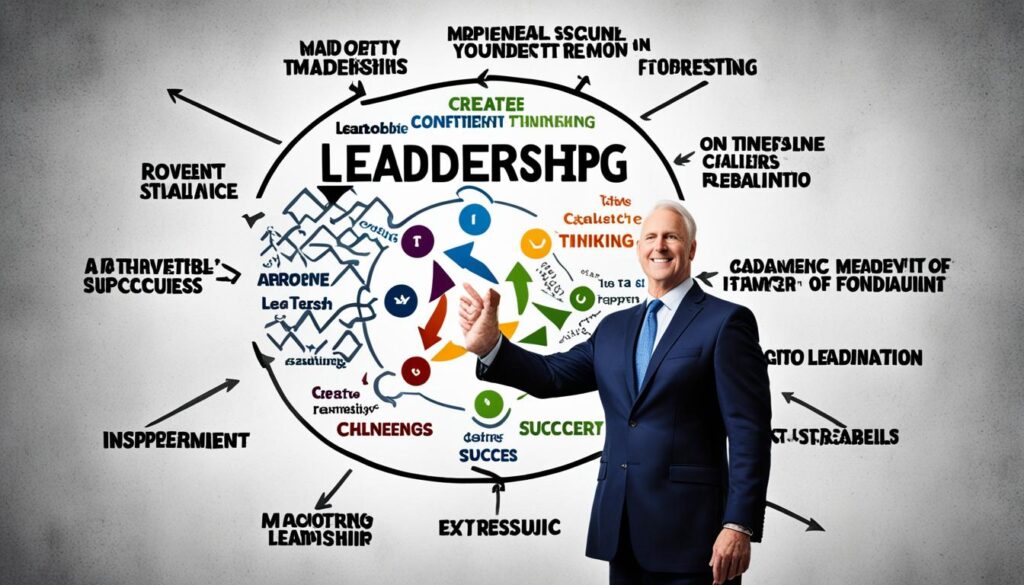Have you ever felt the weight of responsibility as a leader? I remember my first day as a team lead, filled with excitement and uncertainty. The journey of leadership development isn’t just about managing tasks. It’s about cultivating a mindset that inspires and empowers others. This personal growth starts with you.
Studies show that managers account for 70% of the variance in employee engagement. That’s a huge impact! But here’s the good news: leadership isn’t an innate talent. It’s a skill we can nurture through mindset training and dedication.
Companies investing in leadership development see real results. Those addressing mindset challenges are four times more likely to succeed in change programs. It’s clear that fostering the right leadership mindset isn’t just beneficial – it’s crucial for organizational success.
Ready to embark on your leadership journey? Let’s explore the key steps to building a strong leadership mindset that will transform your approach and inspire your team.
Key Takeaways
- Managers influence 70% of employee engagement variance
- Leadership mindset can be developed through training
- Addressing mindset challenges increases change program success
- Effective leadership enhances team collaboration and performance
- Investing in leadership development yields significant business outcomes
- Strong leadership mindset fosters adaptability and resilience
Understanding the Leadership Mindset
A leadership mindset shapes how leaders work with their teams and face challenges. It’s more than just making decisions. It’s about having a view that motivates and leads to success.
Definition of a leadership mindset
A leadership mindset includes the attitudes and beliefs that guide a leader’s actions. It’s how they see opportunities, challenges, and their own growth potential. This mindset comes from self-awareness, understanding emotions, and thinking strategically.

Importance of mindset in leadership
Having the right mindset is key for good leadership. It helps leaders deal with complex situations, motivate their teams, and bring new ideas. Only 10% of people are naturally leaders, showing how important it is to develop a strong mindset.
Key characteristics of a strong leadership mindset
A strong leadership mindset has several key traits:
- Growth orientation: Believing in the potential for continuous improvement
- Emotional intelligence: Understanding and managing emotions effectively
- Strategic thinking: Seeing the big picture and planning for the future
- Resilience: Bouncing back from setbacks and learning from failures
- Authenticity: Being genuine and vulnerable to build trust
Leaders with these traits can better handle challenges, support their teams, and keep morale high. By developing these qualities, leaders can greatly improve their effectiveness and lead their teams to success.
Developing Self-Awareness as a Leader
Self-awareness is key for great leadership. It helps leaders know what drives them, their strengths, and their weaknesses. This knowledge is vital for personal growth and emotional smarts. It lets leaders handle tough situations with ease.
Leaders who take time to reflect do better in many areas:
- Empathy and adaptability
- Confidence and mindfulness
- Patience and kindness
These traits create a positive workplace and encourage teamwork. Self-aware leaders are humble, open to growth, and take responsibility. They seek and use feedback to keep getting better.

Studies reveal that self-awareness is a big part of emotional intelligence. It helps leaders manage their feelings, communicate well, and make smarter choices. This skill is super useful in sales, closing deals, and dealing with criticism.
“Self-awareness is the compass guiding outstanding leaders, inspiring innovation and fostering growth within organizations.”
To get better at self-awareness, leaders can:
- Keep a reflective journal
- Engage in complex decision-making scenarios
- Work with a trusted advisor
- Proactively gather feedback
By focusing on self-awareness, leaders can build a culture of openness and growth. This attracts top talent and boosts productivity. It’s a journey of personal growth that makes leaders more effective.
| Benefits of Self-Awareness | Impact on Leadership |
|---|---|
| Improved decision-making | More strategic and informed choices |
| Enhanced communication | Better team collaboration and understanding |
| Increased emotional intelligence | More effective conflict resolution |
| Greater adaptability | Improved response to change and challenges |
Cultivating a Growth-Oriented Perspective
Having a growth mindset is key for leaders to succeed. Leaders who believe they can grow through effort and learning tend to do better. Studies show that companies led by growth-minded leaders do better in revenue and profits.
Embracing Challenges and Learning Opportunities
Successful leaders see challenges as ways to grow. Jeff Bezos, Amazon’s founder, turned setbacks into learning moments. This mindset helped Amazon become a huge success. Steve Jobs, after being fired from Apple, started NeXT and later brought Apple back to the top.

Fostering Resilience and Adaptability
Being resilient helps leaders recover from failures. Building a support network and taking care of oneself boosts resilience. Being adaptable lets leaders change strategies when things don’t go as planned. Oprah Winfrey’s career shows how staying positive and focused can help overcome obstacles.
Encouraging Continuous Learning and Improvement
Learning continuously helps leaders grow. Sheryl Sandberg looked for feedback to get better at her job at Facebook. Satya Nadella’s focus on learning changed Microsoft’s culture. Research shows that those with a growth mindset are more driven and aim for excellence.
“The capacity to learn is a gift; the ability to learn is a skill; the willingness to learn is a choice.” – Brian Herbert
Companies with a growth mindset are more flexible and skilled at handling complex situations. Investing in leadership development leads to better financial success. Companies that focus on it usually outperform their rivals.
Steps to Build a Strong Leadership Mindset
Building a strong leadership mindset takes effort and practice. Let’s look at key steps to help you improve your leadership skills.
Lead by Example with the Right Mindset
Leaders set the tone for their teams. By being a strong leader yourself, you encourage others to be the same. Show resilience and stay positive, like Jack Welch did at GE, leading it through 600 acquisitions and boosting its value by $265 billion.
Provide Ongoing Feedback and Coaching
Regular feedback is key for growth. It helps team members know their strengths and what they need to work on. Coaching, like what Smita Das Jain has done in 1500+ sessions across 10 countries, can greatly improve leadership skills.
Invest in Leadership Development and Training
Leadership training is crucial for organizations. It gives leaders the skills and knowledge they need. In the hospitality industry, which is expected to make $9.5 trillion in 2023, such training can improve customer satisfaction and staff engagement.
Foster Decision-Making Skills and Accountability
Letting team members make decisions boosts their confidence and accountability. This can lead to a 35% better engagement and performance. In the fast-paced hospitality sector, making strong decisions is key.
- Encourage creative thinking
- Promote clarity of vision
- Enhance communication skills
- Foster adaptability to change
By following these steps, leaders can develop a mindset that leads to success, lifts team morale, and meets organizational goals.
Overcoming Challenges in Leadership Mindset Development
Leaders face challenges no matter their experience or skills. Developing a strong leadership mindset is key for personal growth and resilience. Leaders must tackle various hurdles to build strong teams and achieve success.
Good communication is a key part of being a leader. A study by The Myers-Briggs Company found that 85% of employees face conflicts at work. Leaders need to improve their communication skills to overcome these issues and encourage innovation in their teams.
Knowing oneself is crucial for leaders. Over 85% of Fortune 500 companies use 360-degree feedback to check on performance. This shows how important it is for leaders to keep reflecting and growing.
| Rank | Leadership Challenge | Key Focus Area |
|---|---|---|
| 1 | Remote Team Management | Team identity and open communication |
| 2 | Lack of Communication | Clear and consistent information channels |
| 3 | Change Management | Effective communication during transitions |
| 4 | Employee Mental Health Issues | Prioritizing mental well-being |
| 5 | Conflict Management | Creating safe spaces for expression |
Leaders like Microsoft CEO Satya Nadella and Warren Buffet show how important it is to be adaptable and make smart choices. By encouraging innovation and building strong support, leaders can get through tough times and keep growing.
How Can Case Studies of Successful Leadership Mindsets Inform Steps for Building a Strong Leadership Mindset?
Case studies of successful leaders reveal common traits that form effective leadership mindset strategies. By analyzing how these leaders approach challenges, collaborate, and inspire their teams, organizations can identify actionable steps to cultivate strong leadership qualities. Implementing these insights can empower future leaders to excel and drive success.
Conclusion
Effective leadership is key to a company’s success. It means facing challenges head-on, always learning, and pushing your team to do their best. Leaders who know themselves well and can change with the times do better in business.
Growing as a leader means focusing on your mindset. By thinking positively, leaders turn problems into chances to get better. This not only helps them grow but also makes their team happier and more productive.
In today’s fast-paced work world, leaders need to be both dreamers and doers. By investing in their own growth and keeping lines of communication open, companies can build strong teams. Remember, being a great leader is not about knowing everything. It’s about helping others find new ways to solve problems together.
FAQ
What is a leadership mindset?
A leadership mindset is about the attitudes and beliefs leaders have. It shapes how they work with others, make decisions, and tackle challenges. It affects their actions, relationships, and how they reach their goals and work with a team.
Why is self-awareness important for effective leadership?
Self-awareness helps leaders know their own strengths, weaknesses, and motivations. This knowledge lets them manage themselves better. It helps them predict their reactions and fix their weaknesses. This is key to leading and managing well.
What is a growth mindset, and why is it crucial for leaders?
A growth mindset believes skills and abilities can grow with effort and learning. Leaders with this mindset take on challenges, learn from mistakes, and keep improving. It makes them and their teams adaptable and ready to change when needed.
What are some key steps to build a strong leadership mindset?
Key steps include leading by example, giving regular feedback and coaching, and investing in leadership development. It’s also important to improve decision-making skills and hold people accountable. These actions help create a culture of ongoing improvement and a strong leadership mindset in the organization.
What challenges might leaders face in developing a leadership mindset?
Leaders may struggle with negative thoughts, keeping a growth mindset when things go wrong, and staying humble. They need to change negative thoughts, be resilient, see failures as chances to learn, and stay open to feedback and self-improvement.
Why is a strong leadership mindset fundamental to organizational success?
A strong leadership mindset means being self-aware, focused on growth, and able to inspire others. It improves decision-making, creates a positive workplace, and helps organizations meet their goals. Key to this mindset are continuous learning, self-reflection, and being adaptable.
Source Links
- https://arbinger.com/blog/inspire-excellence-7-steps-to-develop-a-leadership-mindset-within-your-workplace

- https://www.dameleadership.com/research-and-insights/tips-for-leadership-mindset

- https://www.linkedin.com/pulse/developing-leadership-mindset-step-by-step-guide-becoming-baig

- https://executive.berkeley.edu/thought-leadership/blog/leadership-mindset

- https://howleaderslead.com/how-to-develop-a-leadership-mindset

- https://productiveparks.com/developing-leadership-mindset

- https://www.businessnewsdaily.com/6097-self-awareness-in-leadership.html

- https://www.betterup.com/blog/self-awareness-in-leadership

- https://kirbybates.com/blog/self-awareness-in-leadership/

- https://trainingindustry.com/articles/leadership/how-leaders-can-develop-a-growth-mindset-and-improve-their-resilience/

- https://www.linkedin.com/pulse/nurturing-growth-mindset-key-effective-leadership-carlos-goetz

- https://www.mccrackenalliance.com/blog/why-a-growth-mindset-is-crucial-for-business-leadership

- https://www.linkedin.com/pulse/how-develop-leadership-mindset-smita-das-jain

- https://lesroches.edu/blog/leadership-mindset

- https://wdhb.com/blog/leadership-mindset

- https://www.linkedin.com/pulse/leadership-mindset-sean-patton

- https://engageforsuccess.org/strategic-leadership/overcoming-common-leadership-challenges-tips-and-strategies/

- https://engagedly.com/common-leadership-challenges-at-workplace/

- https://wdhb.com/blog/leadership-mindset/

- https://www.linkedin.com/pulse/developing-winning-mindset-effective-leadership-your-life-sue-bolton-8f4fc

- https://lesroches.edu/blog/leadership-mindset/


